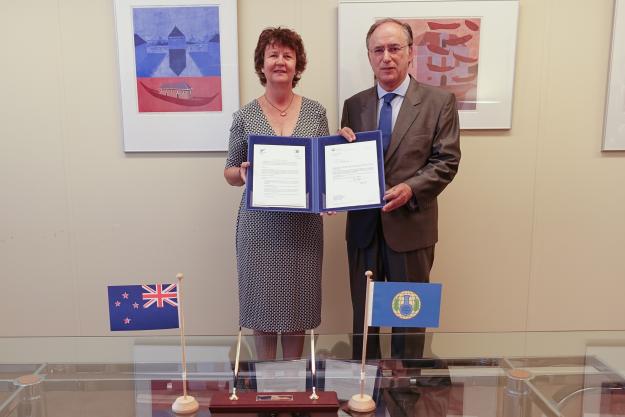
OPCW Director-General, H.E. Mr Fernando Arias and Permanent Representative of New Zealand to the OPCW, H.E. Ambassador Lyndal Walker
THE HAGUE, Netherlands — 21 August 2019 — The Government of New Zealand is contributing €64,000 toward the Organisation for the Prohibition of Chemical Weapons’ (OPCW) Trust Fund for Syria Missions in support of the operations of the team tasked with the identifying the perpetrators of chemical weapons use in Syria, as determined by the OPCW Fact-Finding Mission.
The team was created pursuant to the decision on addressing the threat from chemical weapons use adopted by the Conference of the States Parties at its Fourth Special Session in June 2018.
The donation was formalised through a formal exchange of letters between the OPCW Director-General, H.E. Mr Fernando Arias, and the Government of New Zealand through the Permanent Representative of New Zealand to the OPCW, H.E. Ambassador Lyndal Walker.
At a ceremony at OPCW Headquarters today, the Director-General expressed his gratitude to the Government of New Zealand for its contribution and continued support of the Organisation, adding that all OPCW Member States in a position to make voluntary contributions were encouraged to do so.
Ambassador Walker remarked: “New Zealand remains a strong supporter of the OPCW and its work towards a world free of chemical weapons. New Zealand’s contribution to the Trust Fund for Syria Missions will assist the OPCW in carrying out its important work – including investigating and attributing responsibility for documented use of chemical weapons in Syria.”
Background
On 27 June 2018, the Conference of the States Parties to the Chemical Weapons Convention (CWC) adopted at its Fourth Special Session a Decision on Addressing the Threat from Chemical Weapons Use.
The decision calls upon the OPCW Technical Secretariat to put in place arrangements “to identify the perpetrators of the use of chemical weapons in the Syrian Arab Republic by identifying and reporting on all information potentially relevant to the origin of those chemical weapons in those instances in which the OPCW Fact-Finding Mission determines or has determined that use or likely use occurred, and cases for which the OPCW-UN Joint Investigative Mechanism has not issued a report”.
The decision further affirmed that whenever chemical weapons use occurs on the territory of a State Party, “those who were the perpetrators, organisers, sponsors or otherwise involved should be identified” and it underscored “the added value of the Secretariat conducting an independent investigation of an alleged use of chemical weapons with a view to facilitating universal attribution of all chemical weapons attacks”, if requested by a State Party.
The OPCW Technical Secretariat has already set up a team of investigators and analysts in order to implement the decision adopted by the Conference of States Parties.
As the implementing body for the Chemical Weapons Convention, the OPCW, with its 193 Member States, oversees the global endeavour to permanently eliminate chemical weapons. Since the Convention’s entry into force in 1997, it is the most successful disarmament treaty eliminating an entire class of weapons of mass destruction.
Over 97% of all chemical weapon stockpiles declared by possessor States have been destroyed under OPCW verification. For its extensive efforts in eliminating chemical weapons, the OPCW received the 2013 Nobel Peace Prize.
